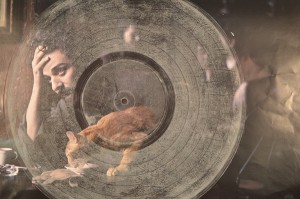
The Coen Brothers have made it their mission to tell us an American story. Not the American story but rather a singular and sometimes beautiful story.
In Inside Llewyn Davis, the Coen Brothers orchestrate a spectacular soundtrack to accompany and to drive the narrative of the film.
Yet one almost hesitates to cast the music of this film in a supporting role for the soundtrack enjoys its own arc—its own story—that stands distinct from the film it was produced for and complements so well.
American folk music is a somber genre full of pining for a lost home as well as a genre celebrating the endurance and resilience required to make a new one. The Inside Llewyn Davis soundtrack is no exception as the album floats from melancholy tracks at its outset such as “Hang Me, Oh Hang Me,” “Fare Thee Well,” “The Last Thing on My Mind,” and “Five Hundred Miles” into the comedy of “Please Mr. Kennedy”—a poke at the commercialization of folk music in the latter half of the 20th century—and moving finally into more traditional immigrant and blue-collar songs such as “The Roving Gambler,” “The Shoals of Herring,” and “The Auld Triangle.”
Yet in the movement of the album, though it may momentarily linger on capitalist cynicism or Appalachian bluegrass, actor and singer Oscar Isaac returns powerfully to the heart of the music and perhaps the American character itself. In “Green, Green Rocky Road” and “Fare Thee Well,” the hope of folk aspirations and the often solitary story of wandering unite and endure together. Even in the title of “Green, Green Rocky Road,” the road is both lush and arduous, both beautiful and difficult. Inside Llewyn Davis celebrates the uncertainty and movement of folk life with an image of a crow persisting as it “keep[s] on flapping / to the Sun.”
However, tracks such as “The Roving Gambler” and “The Auld Triangle” harken back to Depression-era, Dustbowl mood of folk music, where song and lyric live as a catharsis for the rough roads and seemingly random amblings of blue-collar and immigrant life in America. In “The Roving Gambler,” a solitary poker player wins the love of young girl who vows to follow the “gambling man” wherever he goes, leaving her “dear old Mama.” The film, however, abridges the story of the song where, in the final four verses, the gambling man “[leaves] her in El Paso,” “[winds] up in Maine,” and kills another gambling man for cheating. Love, it would seem, is not enough to temper the heart of the gambling man as the roving gambler cannot reliably swear allegiance to anything besides “laying [his] money down” and being what he always has been. The upbeat melody—and indeed the film’s own omission—mask the truth of the song and the story that a close listening to the lyrics reveals.
“The Auld Triangle,” however, diverges slightly from the idea of a lonely wanderer to a four-man a cappella rendition of the song (purportedly) originally composed by Dominic Behan in 1954. The Auld Triangle refers to the loud “jingle jangle” of the instrument used to wake inmates of Mountjoy Prison in Ireland. In the film, the Punch Brothers, Marcus Mumford, and Justin Timberlake come together to sing of the plight of a prison inmate rising in the morning only to face the hopelessness of prison life and “hungry feeling” that the morning once again brings. One might think that the Auld Triangle is merely a device that interrupts dreams, that pulls the prisoner from his fantasies of “[his] girl Sal,” which in fact exist, perhaps within those dreams.
Perhaps, awakening in a prison is, the perfect setting for a folk song. Folk music is precisely a story of living in the aftermath, living after the gambler’s cards have been dealt or the prison sentence has been issued; folk is living the consequences. This is the story of moving on, of wandering, but it is yet unclear of where to go or where one can go. It is as if the Trojan War had already ended and folk music is Odysseus’ travels home. The Homeric simile is quite intentional as in 2000 with the release of Oh Brother, Where Art Thou? and the album of the same name in which the Coen Brothers loosely fuse the Great Depression-Appalachian aesthetic with Homer’s epic, The Odyssey. And, indeed, the cat in Inside Llewyn Davis happens to be named Ulysses. The reference is inescapable and clearly still holds weight in American culture and even beyond. We feel ourselves to be on a journey with a clear goal but no end in sight; we can imagine an end to the journey, but we find ourselves still wandering for one reason or another.
Folk music might very well be, wandering forward while reflecting on a past that you cannot change. Loss and the inability to change that loss is the background of each song; yet in this album there is no unified sorrow for that loss. The Inside Llewyn Davis soundtrack outlines the diversity of emotion and possibility even within a seemingly impossible circumstance—the past is unchangeable, yet how we use the past to form our own identity is progress. It is no coincidence that the album ends not on a somber note, but instead on a reprisal of “Green, Green Rocky Road” sung not by Oscar Isaac but by Dave Van Ronk, a pre-Bob Dylan folk singer whose life serves as a model and inspiration for the film itself. Where Inside Llewyn Davis begins with the lamentations of a wandering life in “Hang Me, Oh Hang Me,” it ends with hope and the acceptance of loss and transience as a part of the beautiful, rocky road.
17,447 Total Views, 6 Views Today






